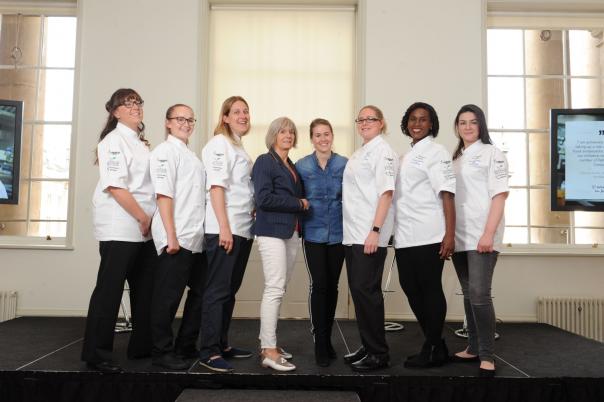
As she went through catering college and took her first footsteps into the business across the channel, Emily did not meet many women.
In one restaurant in the city of Lyon, run by the same chef in charge of her college, women were not allowed to work. “They simply did not employ them,” says Emily.
But as she sat down to answer questions on the food industry’s shortage of females, and to promote the recipe book she co-wrote with Giselle, between 100 and 150 women gathered to listen to her story.
The Rouxs’, and those in the audience, had gathered at Compass Group UK & Ireland’s ‘Women in Food’ event at Somerset House in central London to discuss why there are so few women chefs and debate ways of tackling the problem.
Despite the dominance of males in restaurant kitchens and on TV, and Giselle’s gentle nudges to Emily to take her career in a different direction, Emily, who grew up chopping tomatoes and peeling potatoes at her father Michel Roux Jr’s restaurant Le Gavroche, did not listen.
“I was quite against Emily going to catering college and following in her dad’s footsteps,” said Giselle. “I knew it was going to be tough, long anti social hours and there were a lot less female chef around. But she loved it. She was never going to listen to me.”
The long hours and the complications of trying to forge a successful career in the industry while trying to raise a family were two recurring factors brought up at the event.
“My husband is a chef, I am a chef; he works crazy hours, I work crazy hours. How would it be possible,” said Emily on considering the potential of continuing the Roux dynasty while staying in the kitchen.
Since the launch of its ‘Women in Food’ programme, Compass appears to be one company leading the way with the introduction of a number of initiatives to support its female workforce.
It’s Maternity, Adoption and Shared Parental Leave Pack has been rolled out across the company to try to address this problem.
It aims to help inform and support employees who are expecting or adopting a child, as well as those returning from maternity, adoption or shared parental leave.

It also recently launched a range of industry protective equipment (PPE) (above) specifically for women, from chefs to cleaners.
Dan Perfect, head of services & retail partnerships at Foodbuy (part of Compass) said: “We identified that there was a quite inexplicable issue given that we are in 2017 and that there was no PPE specially for women. As a result we were having a lot of accidents in the workplace which we did not need to have.
“I have two young daughters and as they grow and get ready to go out into the world there are a few things about it that I would change if I could, including that the world is not as inclusive and as diverse I would hope.
“By being involved in a programme like this, to be able to impact that in a small way to make sure that in this one industry they won’t have to worry about that so much.”
But a popular question at the networking event was ‘how else do we make a difference’, a question which Compass chief executive Dennis Hogan asked himself when he addressed the event.
He spoke about the ‘Women in Food’ ambassador programme, a network of eight female chefs whose task it is to support and encourage the needs of their female colleagues.
Hogan recalled a conversation which he had had Perfect in which they asked each other whether the changes introduced within the company would have been made if not for the programme and its ambassadors. He was brave enough to admit that the answer to that question was ‘probably no’.
“35% of our chefs at Compass are women, but we need to get that to 50%. We all need to be passionate about this,” said Hogan.
Just as it took the ‘Women in Food’ programme to bring about changes within the company, it seems that more needs to be done in the wider industry to even the playing field.
“It has changed for the better, but we want to keep on changing it,” said Emily Roux. “I think in the beginning all that we saw was these screaming males chefs on TV and that appealed to guys and not so much to women, but I think that it changing.
“I think chefs are changing their attitudes. We have open kitchens where we can see it is a lot quieter and tamed, which I think can attract more women. We also have a lot more female chefs on TV.”
One of those TV chefs was at the event- Dipna Anand served up food alongside Lisa Roukin at one of the event’s showcase foods stands, all of which were run by women.
With Office of National Statistic figures for 2016 showing the number of female chefs in restaurants is dropping, and kitchens such as those in Lyon described by Emily Roux, still exist, it is clear that there is a long way to go still.
Compass hopes that organising events which brings females from all sectors of the food industry together can help drive the changes needed.
Asked what would she say to young women looking to enter the industry, Emily Roux smiled and replied: “If you love food and are passionate about it, it will happen.”